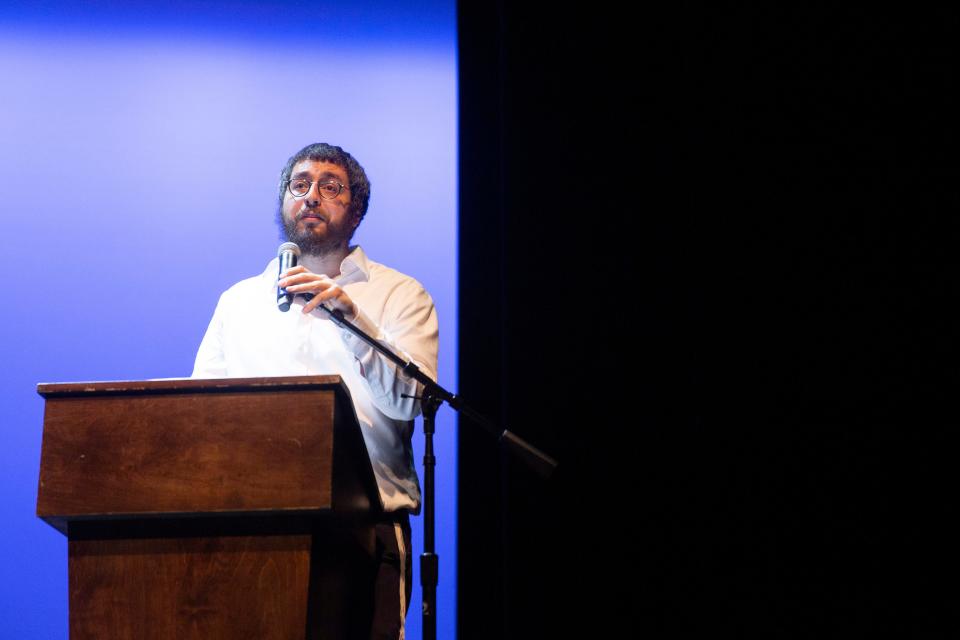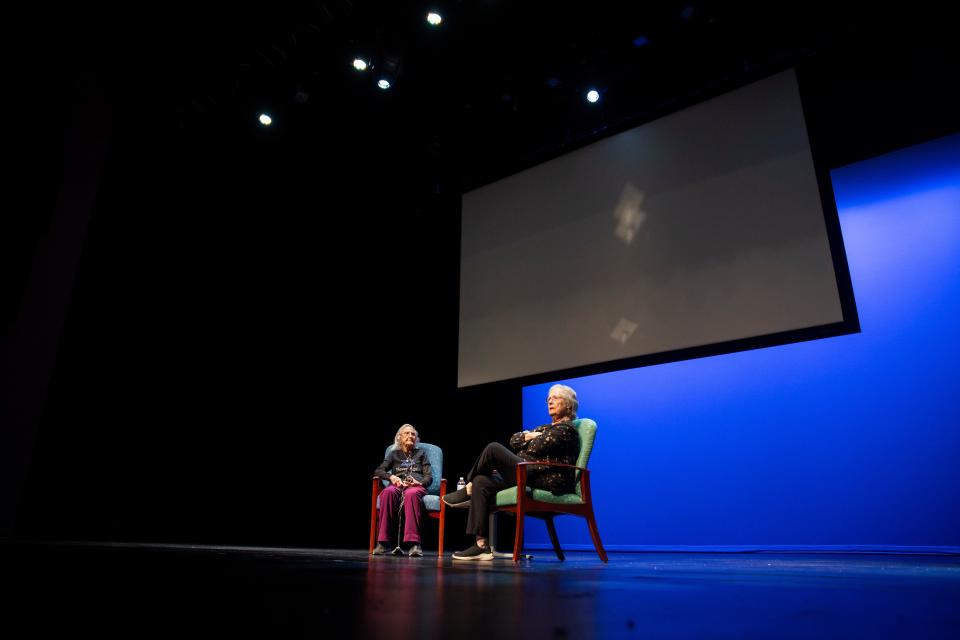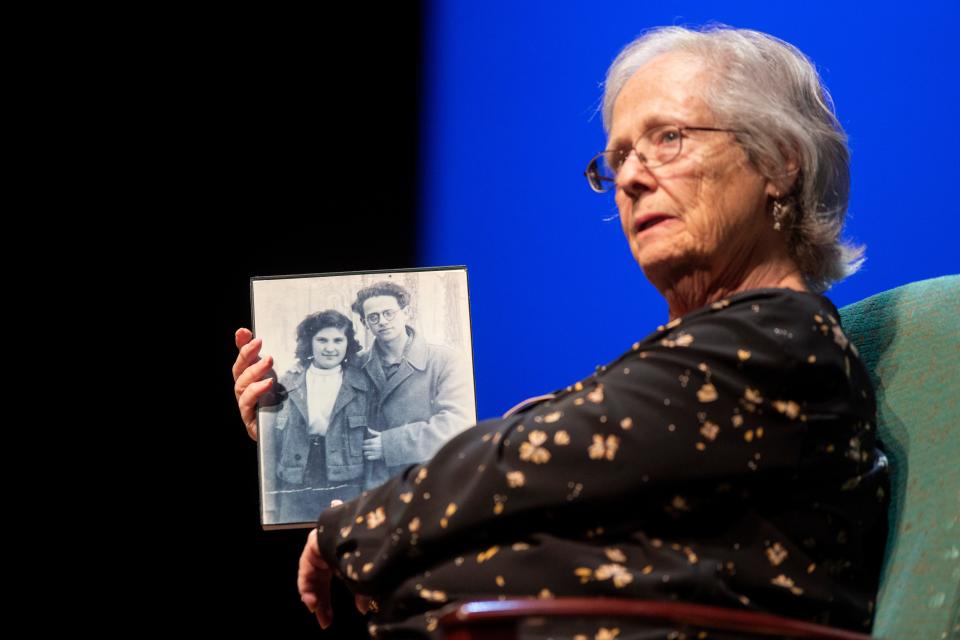'Life is beautiful': Holocaust survivor Esther Basch shares her story of hate and love in Las Cruces
LAS CRUCES – Approximately six million European Jews were killed during World War II, 1.3 million of whom were sent to Auschwitz extermination camp in German occupied Poland.
Auschwitz is known as the largest and deadliest of Nazi extermination camps. Nearly 1.1 million people, or 85%, sent to the camp between 1940 and 1945 were killed. Survivors are aging and Holocaust denial is prominent.
Las Crucens had the rare opportunity to meet survivor Esther Basch, 94, and hear her tell her story of survival and forgiveness.
Rabbi Bery Schmukler of the Chabad of Las Cruces said he and his wife, Chenchie Schmukler, have been working on bringing a Holocaust survivor to speak in southern New Mexico for several years. They were behind Eva Schloss’ visit to Las Cruces in 2019. Schloss is the posthumous stepsister of Anne Frank and a survivor of the Auschwitz-Birkenau camps.
Eva Schloss: Holocaust survivor shares story, touts tolerance and peace during Las Cruces visit
“There are a lot of people who've never met a Holocaust survivor and especially a lot of students,” Schmukler said. “And unfortunately, there's people in the world who are denying the Holocaust and I think it's an obligation for each person to be able to see a Holocaust survivor, in person, and hear their story … And we have to keep the memory of such a tragedy alive to be able to make sure it doesn't happen again.”

Traveling storytellers make a stop in Las Cruces
Basch was born in the Carpathian Mountains in May 1928 in a town that has alternated being part of Hungary and Czechoslovakia. She has lived in Prescott, Arizona for many years. Basch’s daughter, Rachel Turet, said the two of them travel throughout the country telling Basch’s story to receptive audiences.
The mother-daughter duo was welcomed in Las Cruces Sunday, March 26 at the Associated Students of New Mexico State University Center for the Arts on the college’s main campus.
Schmukler said the venue was just about sold out and the audience varied from senior Las Crucens to children.
Basch and Turet have multiple other speaking events planned over the next couple of months.
From child to WWII prisoner of war
Basch’s father was a rabbi and she said she grew up very religious. She described having a wonderful childhood until her teenage years.
A seemingly overnight legal and societal shift had former friends, neighbors and teachers suddenly treating her and other Jewish members of the community horribly. Her father was forced to shave his beard because people would pull on it so harshly, he would bleed.
“When I went to school next day, of course I had to wear a yellow star (of David). The teacher threw me out – ‘you’re a dirty Jew. You don’t have to have an education’ – and I came home crying,” Basch recalled. “I actually liked school. I liked to learn history and all of that, but I had to come home and it was not a fun time. The three friends that I was friends with for years, next day they called me ‘dirty Jew.’ I did not understand at age 14 how I was clean yesterday and today am dirty.”
Jewish people were rounded up and forced to travel by cattle car to Auschwitz in southern Nazi-occupied Poland. People were stuffed inside the car so tightly that there was no room for anyone to sit for several days. Basch said one person in their car died on the way and the rest of the passengers were forced to hold him up.
It was Basch’s 16th birthday when they arrived at the extermination camp. Relief from stepping off the train car was quickly replaced by the horror of being separated from her parents. Basch said Nazi soldiers took the men to the right first. Her mother clung to her hand but soldiers ripped them apart and the older woman was also sent to the right.

Basch later learned her parents were both immediately sent to the gas chambers and killed.
The next year was laced with torture and starvation for Basch and her fellow prisoners. They slept 12 people to each bunk level and were forced to stand outside, no matter the weather, to be counted by soldiers. The counts lasted hours each morning and each night and involved thousands of women.
She said she still has post traumatic stress responses to thunder after enduring counts in bad storms.
Basch even had an encounter with Schutzstaffel physician Josef Mengele. The doctor was known as the “angel of death” and performed inhumane medical experiments on prisoners. Basch said he would join the count each day to send people to the gas chambers or to use them for his latest tests by pointing his cane at them.
“One day he was standing in front of my line and it looked to me like he was pointing the great cane towards me. I stepped out of the line, and he took that incredible cane and pushed it into my bellybutton and pushed me back into the line and took out my best friend,” she said.
Basch described being taken to a different labor camp, Fallersleben in north Germany, after some time. However, she was not originally chosen to go. She explained that she was separated from a friend and snuck through the door to be with her when officers were not looking.
“I believe very, very strongly in God. If not for God, I wouldn’t be here,” Basch said.
At the camp, she was tasked with soldering handles to equipment. Basch said were fingers were often accidentally soldered to the handles, which is why she no longer has fingerprints.
She worked there for nine and a half months before she was transferred to a different munitions factory in Salzwedel, farther north. Workers were forced on a death march between the two factories, and many lost their lives with no food or water for several days.
Basch said Nazi soldiers locked all the prisoners inside the camp and left them for several weeks. They were eventually liberated by American soldiers. Basch was 17.
“First we were shaking because there were uniforms again and we didn’t understand,” Basch said.
She said the men found a Jewish soldier who explained to the prisoners that they were finally free. At that time, she still assumed she would be able to go home and reunite with her parents.
Instead, she was greeted by a male relative who told her nothing was left. She changed course and made her way to Palestine with other displaced persons. On the way, she met Joseph Basch. They quickly grew close, fell in love and were married at a displaced persons camp run by the United Nations.
“The American Army gave them both jackets and the women sewed a skirt out of an Army blanket,” Turet said. “The men gave up cigarette rations to buy a white piece of material because a bride should have white.”

As they nearly reached the Port of Haifa in Israel, British soldiers forcibly removed their group and took them to Cyprus. They found themselves surrounded by barbed wire once again. Six months later, they finally arrived in Palestine.
The couple’s first child, Rachel, was born soon after they made it to Israel. Turet said her parents arrived at a pivotal moment in history because Israel was just establishing itself as a state. The couple went on to have three children.
Joseph Basch and his brothers quickly joined the Israeli army. One of them died in service.
Basch said her father-in-law was living in Ohio and was quite bereaved when his son died. The couple decided to move to the U.S. to be closer to him. It was many years before the family actually arrived in America. They spent time in France and Canada first before making it to the U.S. in 1958.
Turet recalled getting singled out as a young child for being Jewish in Windsor, Ontario, Canada.
“The school that I went to, I was the only Jew, which never even entered my mind. I’m not even sure at that point that I knew I was Jewish, I was 6. And mom told me that I would have to tell the teacher that I would have to take off the following day because it was Yom Kippur,” Turet said. “I did, and that’s how everybody found out I was Jewish … These children had been taught and truly believed that I, at age 6, had personally killed Christ. That I drank the blood of Christian babies. That I had horns.”
Turet said she believes children are born “blank slates” and are not programed to hate, but are taught. She was ridiculed and thought being Jewish was a bad thing.
“My parents believed I was the clumsiest kid on the planet because I came home with bruises and blood,” she said.
Turet said her mother has always stived to be a positive, upbeat person, despite the horrible circumstances that marred her early life. However, she described her father as a “bitter survivor.”
“He died right around his 80th birthday. And he suffered so badly from anger and resentment, but he lived a very different life than my mother, even before they met,” Turet said.
Sharing her story of struggle and perseverance
"I don't even have a picture of my parents, nothing. But what I have is what they taught me. To be good. If you can’t do anything good, don’t do anything bad. Love all people no matter what. Love God and think positive and you’re going to have a happy life. And that’s how I live my life. Life is beautiful because of what my parents taught me, and I follow.”
Turet is working with filmmakers to create a documentary about her mother’s life. “The Honey Girl” was filmed during the COVID-19 pandemic. Turet said speakers were sent equipment and had to film themselves because in-person interviews were not possible.
The documentary is in its final stages of production. Turet said the goal is to release it to the public this coming summer.
The name comes from Basch’s story following her liberation by American soldiers. She was offered some honey by someone in the nearby town but became very sick after trying some. The sudden intake of sugar after over a year without was a shock to her system and she was hospitalized.
Basch reunited with Max Lieber, one of the U.S. soldiers who liberated her group in Germany, many years later. Lieber lived in New Mexico and the two became good friends. Turet said Lieber remembered her mother as the “honey girl.”
People can view a preview of the film and stay up to date on progress online at honeygirlfilms.org.
“Mom’s story is not about chimneys,” Turet said. “Her story is helping people to live with the truth of love and forgiveness as a self-preservation. And she’s one of the happiest people you’ll ever know.”
Others are reading:
Feds: Middleman in drug deal pleads guilty to murder, drug charges
LCPS chief of staff named interim superintendent of the district
Leah Romero is the trending reporter at the Las Cruces Sun-News and can be reached at 575-418-3442, LRomero@lcsun-news.com or @rromero_leah on Twitter.
This article originally appeared on Las Cruces Sun-News: Holocaust survivor Esther Basch shares her story of hate and love in Las Cruces

